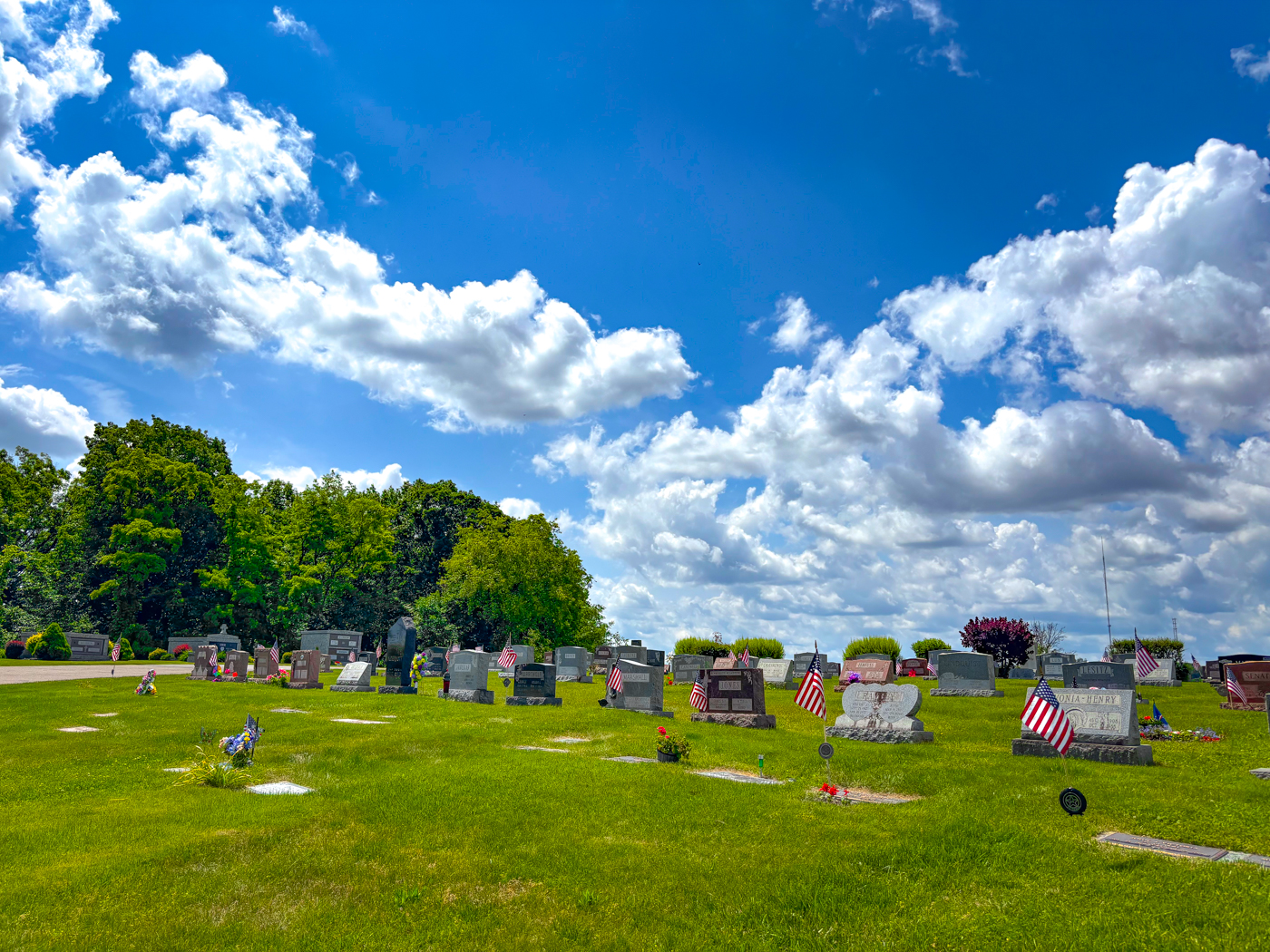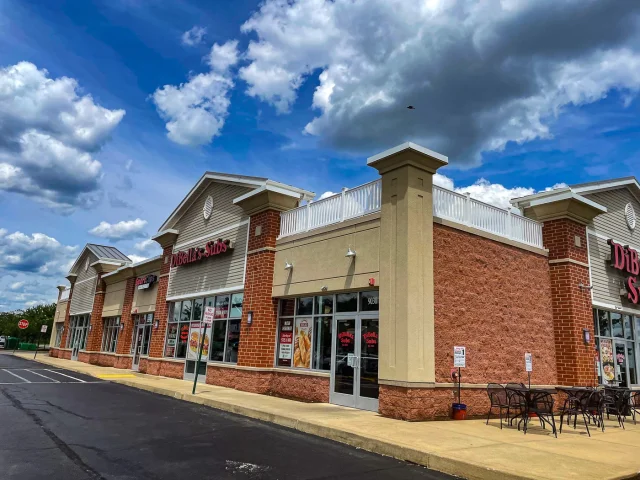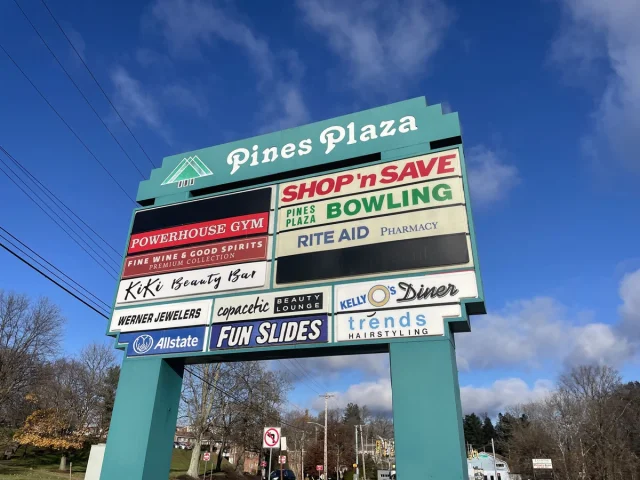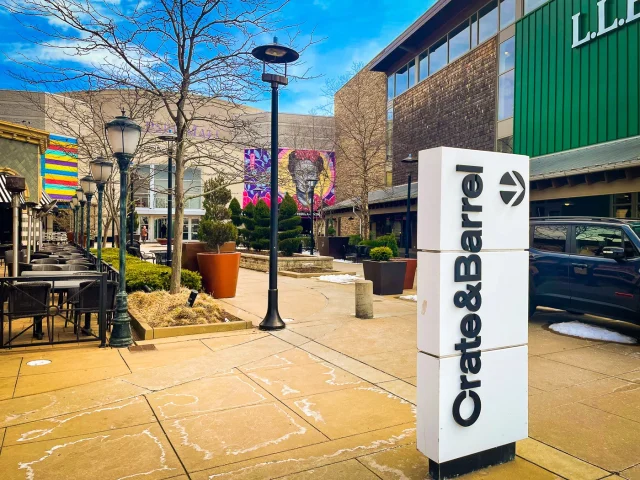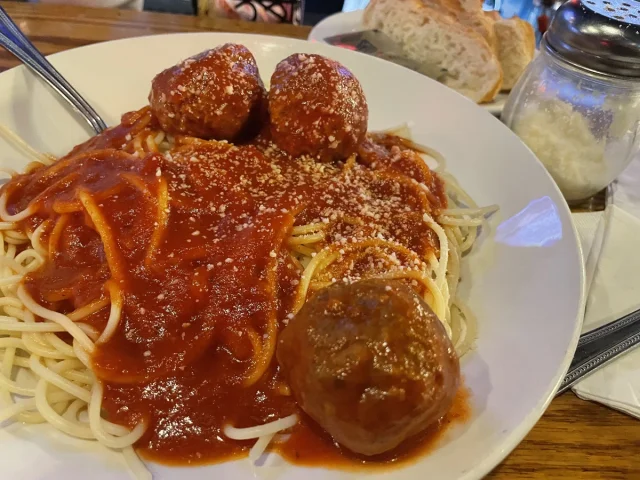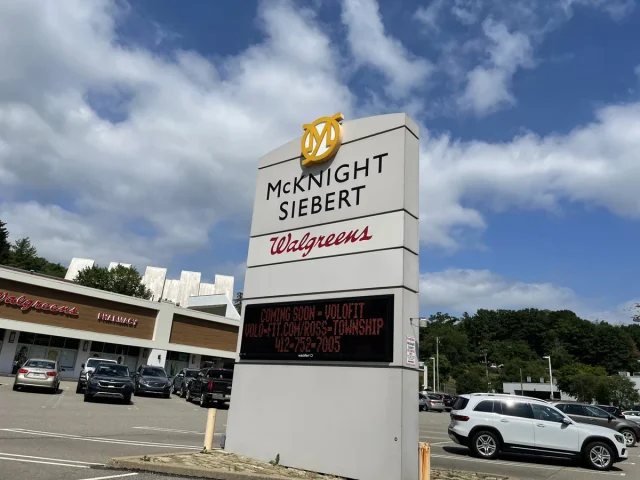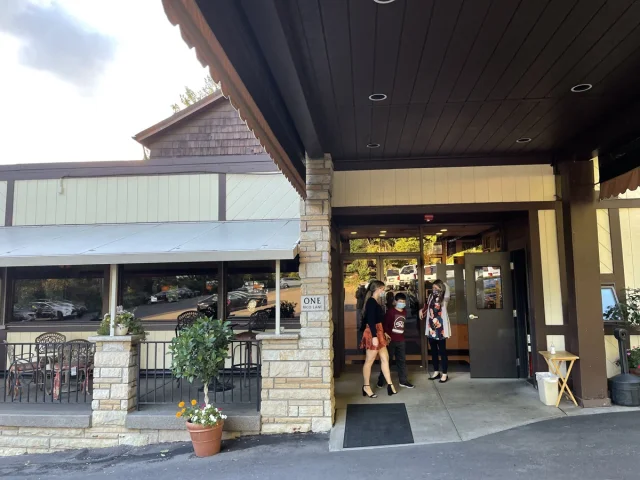Though my family and I knew my father had carefully planned his estate and communicated his preferred funeral arrangements before he passed peacefully at Kane Regional Health Center in Ross Township at the age of 77 in May, the loss still struck us profoundly. Despite my father's planning, we still found ourselves with an overwhelming number of tasks to handle all at once. From notifying friends and relatives to coordinating with the funeral home, it felt like an endless list of responsibilities descended upon us during an already emotionally draining time.
Therefore, I have two hopes for this guide to planning a funeral: first, to provide a general checklist of things you will need to do when planning a funeral for a loved one. This includes everything from selecting a funeral home and coordinating with them, to choosing the type of service and arranging transportation. Second, to help you understand the main areas of funeral planning in more depth. We will cover the different types of ceremonies, the options for memorialization, and the importance of considering the wishes of the deceased and their family. By the end of this article, you should feel more prepared and informed about the steps involved in this challenging but important process.
Across Pittsburgh: General Funeral Planning Checklist
This checklist provides a general overview of steps to consider when planning a funeral to ensure a respectful and meaningful tribute to your loved one. It includes guidance on selecting a funeral home, deciding on burial or cremation, choosing a casket or urn, arranging for a memorial service, and considering any religious or cultural traditions that should be honored. Additionally, it offers tips on notifying family and friends, arranging transportation for the deceased, and handling legal and financial matters. By following these steps, you can create a heartfelt and dignified farewell for your loved one.
- Notify Family and Close Friends: Inform immediate family members and close friends about the passing.
- Select a Funeral Home: Choose a reputable funeral home to assist with the arrangements.
- Determine Type of Service: Decide on a traditional funeral service, memorial service, visitation, or celebration of life.
- Decide on Burial or Cremation: Choose between burial or cremation based on personal preferences or religious beliefs.
- Set Budget and Financial Planning: Establish a budget for the funeral expenses and consider financial options available.
- Arrange for Officiant/Clergy: Coordinate with an officiant or clergy member to lead the service.
- Select Venue and Date: Choose a location for the service and set a date and time that works for all involved.
- Obtain Death Certificates: Request death certificates from the funeral home to handle legal matters.
- Plan the Order of Service: Outline the program for the service including readings, music, eulogies, and rituals.
- Choose Casket or Urn: Select a casket for burial or an urn for cremation based on personal preferences.
- Arrange Transportation: Organize transportation for the deceased, family, and guests to the service and burial site.
- Coordinate Floral Arrangements and Donations: Arrange for flowers, charitable donations, or memorial gifts as desired.
- Communicate Service Details: Share information about the service with relatives, friends, and acquaintances.
- Plan Reception/Meal: Organize a reception or meal following the service if desired.
- Handle Obituary and Funeral Programs: Prepare and publish an obituary and create funeral programs for attendees.
- Consider Cultural or Religious Customs: Incorporate any cultural or religious customs into the service as appropriate.
- Delegate Tasks and Support: Assign roles to family members or friends to help with different aspects of the planning.
- Follow Up and Thank You Notes: Send thank you notes to those who offered condolences or assistance after the service.
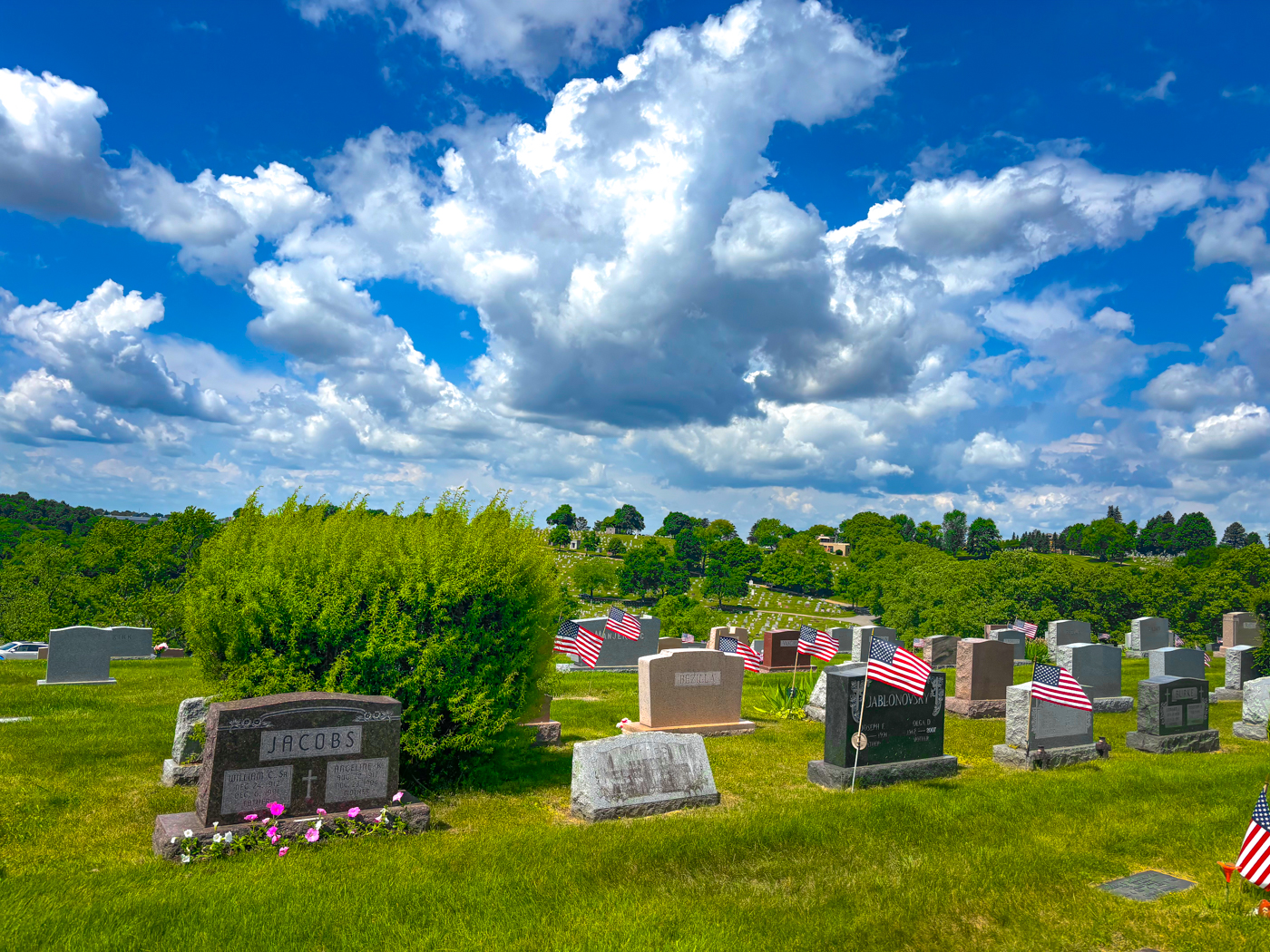
A hilltop view from Christ Our Redeemer Catholic Cemetery, Saturday, May 26, 2024. AcrossPittsburgh.
Funeral Planning Considerations
When planning a funeral, there are several considerations to keep in mind to ensure everything runs smoothly and honors your loved one appropriately.
Understand the Deceased Wishes
Firstly, it’s essential to understand the deceased's wishes if they left any instructions or had prearranged plans. This can alleviate some decision-making pressure and ensure that their preferences, whether for burial or cremation, are respected. Another critical aspect is setting a budget. Funerals can be expensive, and having a clear financial plan can help prioritize expenses and avoid unnecessary debts. Even if you don't have a lot of money to work with, it is important to know how to budget what you do have.
Type of Service
Next, consider the type of service you want to hold. Options range from traditional religious ceremonies to more contemporary celebrations of life. The type of service can influence decisions about the venue, officiant, and content of the ceremony, including readings, music, and eulogies. Additionally, it's crucial to manage logistics such as transportation for the family and guests, floral arrangements, and compiling obituaries and memorial programs.
Emotional Support
Lastly, emotional support is crucial during this period. Enlist the help of family and friends, and don't hesitate to lean on professional services like grief counselors or funeral directors who can offer valuable support and guidance. By carefully addressing these considerations, you can create a meaningful tribute that honors your loved one's memory.
Different Funeral Service Options
When it comes to honoring a loved one's life, there are various funeral service options to consider, each offering unique ways to celebrate their memory.
Traditional Funeral Service
A traditional funeral service typically includes a viewing or visitation, a formal ceremony, and a graveside service. This is what we did for my father.
The structure comprises several elements: a eulogy, readings from religious or secular texts, music, and sometimes a slideshow of photographs. This option provides a familiar and structured environment for family and friends to pay their respects.
We choose Devlin Funeral Home in Ross Township for viewing and visitation, St. Sebastian Church, which is part of Our Lady of Mt. Carmel Parish encompassing the North Hills of Pittsburgh, is where we held a service in honor of my father.
More on this part later, but a good funeral director, which we had at Devlin Funeral Home, is instrumental in helping coordinate all the services.
Memorial Service
Unlike a traditional funeral, a memorial service is usually held after the burial or cremation has taken place. This type of service can be tailored more flexibly to reflect the personality and interests of the deceased.
Memorial services often feature tributes from family and friends, memory boards with photos, and even video montages. They can be held in various locations such as parks, community centers, or even private homes.
Graveside Service
A graveside service is a simpler option, focusing solely on the burial ceremony at the cemetery. Often shorter than a traditional funeral, this service may include a brief eulogy, prayers, or readings, and is typically attended by close family and friends. It's a more intimate setting that provides a moment for the immediate family to say their final goodbyes.
For my father, we initially opted for a chapel prayer at Christ Our Redeemer Cemetery in Ross Township, but our funeral director indicated that the weather was going to be nice and that even if we did not have pall bearers confirmed, he and the Hearse driver, could help if needed. Luckily, we had plenty of pall bearers to choose from after I had put the word out that we were doing to do a graveside burial following the Church service at St. Sebastian.
Celebration of Life
A celebration of life is a more contemporary and upbeat approach to honoring a loved one. This type of service focuses on joyfully celebrating the deceased's life rather than emphasizing loss. It can include music, dancing, storytelling, and other personalized activities that the loved one enjoyed. Celebrations of life are often held in unique venues such as banquet halls, beach locations, or even sports clubs. You can do it anyway you want. We are Pittsburgher's after all.
Moreover, as Pittsburghers, we like to think this type of celebration is more akin to a wake. A wake is an Irish tradition that involves a gathering of family and friends to remember and celebrate the life of the deceased. It often includes food, drinks, music, and storytelling. This is something we thought my father would have wanted as a send off.
However, because my father ran in several circles—and he settled down over the years in more of a grandfather role—we had a distinct group of family and friends some of which preferred a simple beer and informal get together to talk about old stories with "Uncle Jimmy" and we had others that preferred to see a beautiful service followed by an elegant luncheon held in his honor. There were many that wanted to do both types. What did we do?
We did both—on a budget too.
After the viewing, we invited any immediate friends and family that desired to share old stories and talk about this great man, to stop down at Knuckleheads Bar in Ross Township for a beer or two and some pizza from Large Plain in McCandless. Because our burial service was the next day during work hours, we thought this had the added benefit as a way for family and friend, who had already reserved time in the evening for the viewing, to simply stop down, relax and share a story or two over a beer. That worked for us. Knuckleheads put a reserved set of tables out for us and told us we could bring our own food (ordered from Large Plain). Though we ordered pizzas, Knuckleheads also offered a good menu of pub grub to choose from as well. While I offered to pay the tab, most generally were happy to have a beer in his name on their dime. So the cost was very little to do this.
Following the ceremony the next day, we then had a banquet lunch at Monte Cellos on Babcock Blvd. They did a great job of providing a room and catering a meal of ravioli, meatballs, fried chicken, green beans almondine, roasted potatoes, Caesar salad, soft drinks and coffee. They put a table out for us to share our desserts, cookies, and other pastries. A cousin brought a speaker and played oldies that were a favorites of my father. The cost for Monte Cellos is basically close to $20 per person. We had 30 people and the bill, which included a tip, was around $800, give or take. Worth every dollar. The food was delicious and those that had never been to a Monte Cello's, such as some relatives from West Mifflin, were duly impressed.
Green Burial
This was not something we considered, but green burials are becoming increasingly popular for those who wish to minimize their environmental impact. These services forego traditional embalming and use biodegradable caskets or shrouds. The body is buried in a natural setting, such as a woodland or meadow, often with a simple marker or no marker at all. Green burials offer a way to honor a loved one while also contributing to the conservation of natural spaces.
The Role of Funeral Directors
A good funeral director is key and we had a great one in Joseph Mignella, funeral director at Devlin Funeral Home in Ross Township.
We felt Joe exemplified what a great funeral director is all about. He walked us through each and every step of the funeral process. He was comforting, light hearted when needed, and over all, extremely professional and knowledge. He handled all the details and told us each step of the way what we needed to do next.
Joe, and other funeral directors like him, play a crucial role in guiding families through one of the most challenging times in their lives. Their responsibilities extend far beyond merely arranging the logistics of a funeral; they offer compassionate support, expert advice, and meticulous attention to detail, ensuring that every aspect of a loved one's farewell is handled with the utmost care and respect. We had all that in Joe.
Key Responsibilities
Funeral directors are tasked with a myriad of duties, beginning with the initial meeting with the grieving family. During this meeting, they discuss the deceased's final wishes, help plan the type of service that best honors their memory, and coordinate all necessary arrangements. This includes scheduling and organizing the visitation, funeral, and burial or cremation services, as well as arranging transportation for the body.
In addition to logistical planning, funeral directors handle all the necessary paperwork and legal documentation. They obtain the death certificate, ensuring it is correctly filled out and filed with the appropriate authorities. They also assist with permits required for burial or cremation and coordinate with cemeteries and crematoriums. Joe did all that for us, and you should expect the same from a funeral director of your choosing.
Emotional and Practical Support
Beyond their organizational duties, funeral directors like Joe, provide invaluable emotional support. They offer a listening ear and a comforting presence, helping families navigate their grief and make informed decisions during a very stressful time. Funeral directors often have specialized training in grief counseling, which equips them with the skills to provide compassionate support and guidance.
Funeral directors also help with practical considerations, such as selecting the casket or urn, arranging for floral tributes, and coordinating music and readings for the service. They ensure that every detail reflects the personality and preferences of the deceased, creating a meaningful and personalized farewell.
Coordination and Communication
Efficient communication is another critical aspect of a funeral director's role and our funeral director, Joe was a natural. He liaised with multiple parties, including clergy or celebrants, musicians, florists, to ensure that the funeral service ran smoothly and according to plan. This coordination helps alleviate the burden on the grieving family, allowing them to focus on mourning and remembrance.
Joe even texted me directly to ensure I was running on time or not missing anything. Okay, a few times, I was running behind.
Cultural and Religious Sensitivity
Funeral directors are also mindful of and sensitive to cultural and religious practices. They work closely with families to ensure that all rites, rituals, and ceremonies are respected and incorporated into the service. Their knowledge of diverse funeral traditions allows them to cater to the unique needs and preferences of families from various backgrounds.
Our funeral director Joe contacted the church and arranged the service. A day later, we got a call that Fr. Joe at Our Lady of Mt. Carmel Parish would be handling my father's service and burial.
Aftercare Services
The support of a funeral director often extends beyond the funeral service itself. Many offer aftercare services, helping families deal with the practicalities that follow a death, such as assisting with estate settlement or connecting them with grief counseling services. This continued support can be invaluable as families adjust to their new reality.
In summary, funeral directors are indispensable in the funeral planning process. Their blend of professional expertise and compassionate care ensures that loved ones are honored with the dignity and respect they deserve, providing families with solace and support during their time of need.
 Memorial Day Weekend flags grace this hilltop view from Christ Our Redeemer Catholic Cemetery, Saturday, May 26, 2024. AcrossPittsburgh.
Memorial Day Weekend flags grace this hilltop view from Christ Our Redeemer Catholic Cemetery, Saturday, May 26, 2024. AcrossPittsburgh.
Financial Aspects of Funeral Planning
Funeral planning inevitably involves significant financial considerations, and understanding these can help families make informed decisions during a difficult time.
The costs associated with a funeral service can vary widely, depending on the type of service, the chosen venue, and additional elements like floral arrangements, obituaries, or memorial keepsakes.
Based on the information gathered, in 2023, the average cost of a funeral varied depending on the type of service. Here are some statistics on the average costs:
- The median cost of a funeral with a viewing and burial was approximately $7,848 in 2023.
- The median cost of a funeral with viewing and cremation was $6,280 in 2023.
- On average, a full-service funeral could cost between $6,000 and $10,000 in 2023.
The primary expenses include professional service fees charged by the funeral home, which cover the arrangement and coordination of the funeral. This fee often includes the costs for the funeral director and staff, transportation of the body, and the use of facilities for viewing and the service itself. Additionally, costs for the casket or urn, embalming, and other preparation of the body must be considered.
Burial or Cremation Costs
Whether the deceased is to be buried or cremated has a substantial impact on the overall cost. Traditional burials generally involve expenses for a burial plot or crypt, a grave liner or vault, and the opening and closing of the grave. Cremation may involve lower direct costs but might include expenses for cremation caskets, urns, and a separate memorial service if desired.
Additional Services and Products
Families may also choose to incorporate various additional services or products to personalize the funeral, which can add to the cost. These might include specialized floral arrangements, obituary notices, memorial cards, and catered receptions. Each of these services should be evaluated for both their emotional significance and financial impact.
Prepaid Funeral Plans
One option that families might consider to manage costs is a prepaid funeral plan. These plans allow individuals to prearrange and prepay for their funeral, locking in specific services and prices. While this can alleviate the financial burden on surviving family members, it’s important to thoroughly understand the terms and conditions of such plans to ensure they are reputable and that all desired services will be covered.
In our case, my father had prepaid for a plot at Christ Our Redeemer Catholic Cemetery.
To emphasize that this indeed saves money, the plot he purchased ten years ago at a little over a thousand dollars would have been closer to three thousand dollars if we had to buy it today.
Insurance and Government Benefits
Life insurance policies and government benefits can also play a crucial role in covering funeral expenses. Beneficiaries may use the proceeds from life insurance to finance the funeral. Additionally, certain social security benefits or veterans' benefits might be available to help offset funeral costs. It's advisable to explore all potential financial supports to ease the burden during this time.
By carefully considering all financial aspects and exploring various payment options, families can ensure a dignified and respectful farewell for their loved one without facing undue financial hardship.
Trends in Funeral Planning
The funeral industry, like many others, has seen significant changes and emerging trends over recent years. These trends reflect evolving societal attitudes, technological advancements, and a greater emphasis on personalization and sustainability.
Green and Eco-Friendly Funerals
One notable trend is the growing interest in green and eco-friendly funerals. This approach focuses on minimizing the environmental impact of funeral practices. Options such as biodegradable caskets, natural burial grounds, and eco-friendly urns are becoming increasingly popular. Natural burials, where the body is interred in a manner that allows it to decompose naturally, offer an alternative to traditional burial methods and often take place in designated natural burial preserves.
Digital Memorials and Virtual Services
The digital age has brought about the rise of online memorials and virtual funeral services. These options provide ways for distant relatives and friends to participate in mourning without being physically present. Digital memorial platforms allow families to share memories, photos, and videos, fostering a sense of community and remembrance. Virtual services, conducted through video conferencing tools, gained particular prominence during the COVID-19 pandemic and continue to be a viable option for those who cannot attend in person.
Personalization
There's a growing trend towards highly personalized funerals that reflect the individual’s unique personality, life, and legacy. Families are increasingly opting for services that include personalized elements such as custom playlists, memory tables with personal artifacts, themed decorations, and bespoke ceremonies. This shift towards personalization helps make the service a more meaningful and comforting experience for those in attendance.
Preplanning and Prepayment
Preplanning and prepayment of funerals have become more common as people recognize the peace of mind it provides. This trend involves individuals planning their own funerals in advance, making decisions about everything from the type of service to the choice of music and readings. It ensures that their wishes are honored and lessens the emotional and financial burden on their families.
Non-Traditional Venues
Another emerging trend is the use of non-traditional venues for funeral services. Instead of conventional funeral homes or religious buildings, more families are choosing locations that had significance to the deceased, such as parks, beaches, family homes, or community centers. This trend is part of a broader move towards creating ceremonies that are both unique and personally meaningful.
Memorial Keepsakes
As part of the personalization trend, memorial keepsakes have also gained popularity. These can include items like custom jewelry containing a portion of the deceased's ashes, printed memorabilia with photos and dates, and handcrafted items like quilts or sculptures made in memory of the loved one. These keepsakes serve as tangible connections to the deceased and offer comfort to the bereaved.
Technological Innovations
Advancements in technology have also affected funeral planning and services. For example, memorial tribute videos, live streaming of funeral services, and even augmented reality experiences are being integrated into modern funerals. Websites and apps specifically designed to manage and organize funeral plans are also on the rise, making it easier for families to coordinate and personalize services.
By embracing these trends, the funeral industry continues to evolve, offering more diverse and personalized ways to honor and remember those who have passed.
Legal Aspects of Funeral Planning
In some ways, we knew we had the luxury of time since my father spent months at Kane Community Living Center and we were able to talk about his estate. If your parents are still alive, have a talk with them about these things. You will be glad you did.
Understanding the legal aspects of funeral planning is essential to ensure everything is conducted properly and in compliance with state and federal laws.
Obtain Death Certificate
One of the first steps upon death is to obtain the death certificate, which is a legal document issued by the state that confirms the person's death. This certificate is required for various tasks, such as settling the estate, claiming life insurance, and arranging the funeral services. In our case, the funeral directory at Devlin, provided 5 copies as part of the package of services we selected.
Wills and Other Legal Documents
Next, check if there is a will or other legal document that specifies the deceased's wishes regarding their funeral and burial arrangements. If the deceased left specific instructions, it is legally binding to follow those as closely as possible, unless there are extenuating circumstances. Additionally, you will need to address issues related to the deceased's estate, such as notifying relevant authorities, closing accounts, and distributing assets according to the will or state law if there is no will.
Regulations
It’s also crucial to understand the regulations surrounding burial or cremation. Different states and localities have varying laws regarding how and where bodies can be buried or cremated. Funeral homes and directors can provide guidance on these regulations to ensure compliance. In cases where interstate arrangements are necessary, additional legal paperwork and coordination with multiple jurisdictions may be required.
Veteran Benefits
If the deceased was a veteran, there may be specific benefits and honors available, including burial in a national cemetery and military funeral honors. Ensure these benefits are properly claimed by contacting the U.S. Department of Veterans Affairs or relevant government agencies.
My father wasn't a veteran because they discovered during the Vietnam draft he had a bad heart valve. He was depressed he could not serve, but observed that a lot of people he knew, died in Vietnam. Therefore, his faulty heart valve, ironically could have prolonged his life.
Legal Executors
Lastly, consider the importance of establishing legal authorization for those making the arrangements. This might involve designating a legal executor or obtaining necessary permissions from next of kin to ensure that all decisions made are legally substantiated.
By comprehensively addressing these legal aspects, you can ensure that the funeral planning process runs smoothly, respects legal requirements, and honors your loved one's final wishes.
Final Thoughts
Planning ahead for a funeral can make an emotionally challenging time a bit more manageable and ensure that the wishes of the deceased are honored. The more informed and prepared you are, the smoother the process will be. From preplanning and prepaying to understanding legal aspects, every step taken in advance can significantly ease the burdens on loved ones. Discussing preferences and making decisions early not only ensures that the service reflects the individuality of the deceased but also provides peace of mind for everyone involved.
In addition to preplanning, enlisting the help of a knowledgeable funeral director can be indispensable. Funeral directors offer expertise and support, guiding families through every detail, from obtaining necessary documents to coordinating venues and services. Their experience in navigating legal requirements and their ability to provide emotional support can be invaluable during such a difficult time. By working closely with a funeral director, families can create a meaningful and personalized farewell, easing the stress and allowing them to focus on honoring their loved one.
In Memoriam: James F. De Reno (1946 - 2024)
Across Pittsburgh wishes to dedicated this guide in the loving memory of James F. De Reno, a tried and true Pittsburgh father. Without him, this website doesn't exist. Rest in peace!
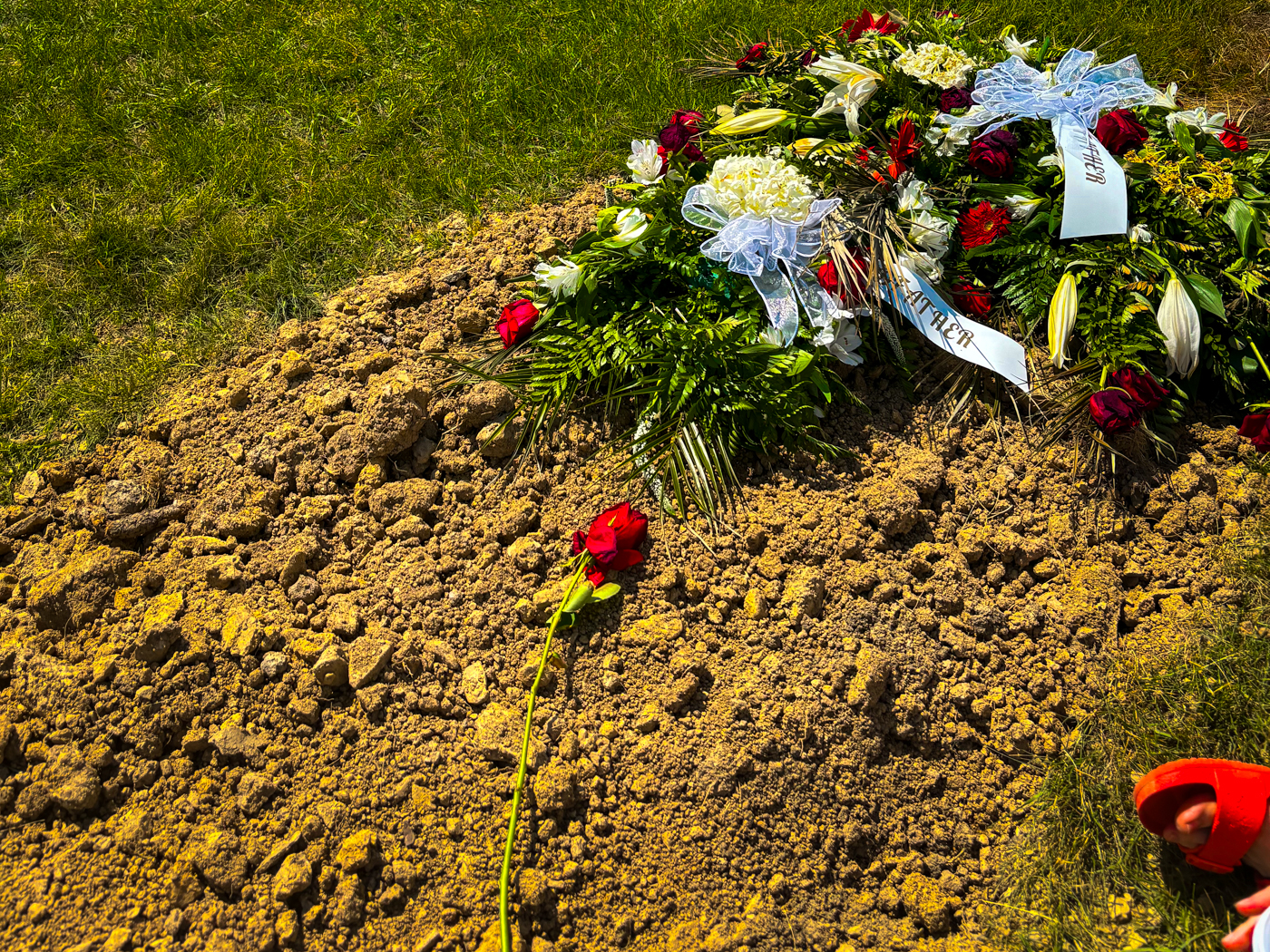
Final resting place of James F. DeReno (1946 - 2024) at Christ Our Redeemer Catholic Cemetery in Ross Township, May 25, 2024. (Photo by beloved son of James, Matthew J. De Reno)
Learn More: Pittsburgh Funeral Planning Resources
Overwhelmed with funeral planning and or the resources needed? This section lists resources where you can find help and assistance with funerals.
Carson's Village
If you have never experienced the sudden loss of a loved one, it’s hard to anticipate the many practical details you’ll need to manage. From making burial arrangements and hosting family and friends to planning funeral services and tracking gifts like meals, flowers, and monetary donations, there are numerous tasks that require your attention in the days following your loss. Carson’s Village offers a wide range of free support services to help your family navigate this challenging time.
- Visit Program Website - https://carsonsvillage.org/
Veteran and Dependent Burial in VA National Cemeteries
The National Cemetery Administration honors veterans and their families with final resting places and lasting memorials that commemorate their service to our nation.
- Visit Program Website - https://www.cem.va.gov/burial_benefits/
Pittsburgh Cremation & Funeral Care
Pittsburgh Cremation and Funeral Care serves all families including those with financial difficulties. They believe that everyone deserves a dignified and respectful funeral service, which is why they offer financial assistance to those who may be eligible.
- Visit Program Website - https://www.pittsburghcremation.com/pittsburgh-cremation-services/no-cost-cremation/


